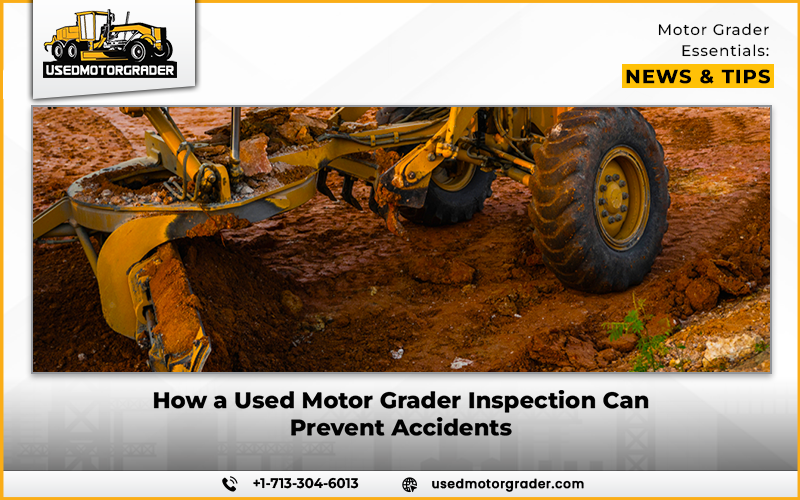In construction, motor graders are essential for maintaining roads and leveling surfaces. Purchasing a used motor grader is a rational decision for many contractors because it offers performance without the excessive cost of brand-new machinery.
However, the responsibility to ensure safety comes along with the advantages of affordability.
A seemingly dependable machine can turn into a hazard on the job site if it is not properly inspected.
In addition to putting operators at risk, accidents can result in expensive delays. This gap is filled by routine inspections, which improve the machine’s life and provide contractors with peace of mind.
Why Inspections Matter for Used Equipment
A used motor grader has a track record, unlike new equipment. It potentially endured the years of demanding work, irregular upkeep, or exposure to adverse site conditions.
Even though these machines are still very useful, if hidden problems like worn brakes. Broken hydraulics or weak structural elements are not addressed, they can quickly result in accidents.
These issues are found during an inspection before they become more serious. It enables contractors to schedule maintenance, swap out worn components, and confirm that the machine satisfies safety regulations.
More significantly, inspections maintain a stable and effective working environment while shielding operators from unforeseen malfunctions.
Here are the most essential points:
- It enhances construction site safety
- Prevent major site hazards and accidents
- Reduce the cost of operations
- Extend the life of the used motor grader
- Improve project productivity
- Ensures compliance with regulations
Preventing Mechanical Failures on the Job
Mechanical malfunctions are one of the primary reasons for equipment accidents. In the case of used motor graders, potential risks include malfunctioning steering systems.
Moreover, defective brakes or hydraulic leaks also pose the potential to endanger. If not addressed, such problems impair an operator’s control over the machine. Especially on slopes or in confined areas.
Regular inspections guarantee that every part is working correctly. Contractors may inspect the brakes, check fluids, and examine hydraulic hoses for cracks or leaks.
These may be mundane steps, but they are critical to minimizing risks. Spending a little time up front with inspections saves contractors from expensive downtime.
More importantly, keeps accidents from happening that will hurt workers or cause damage to buildings.
These are some of the major mechanical failures during operations:
- Problem in the Hydraulic system
- Break failure
- Oil leakage
- Overheat (also due to weather conditions)
- Contamination
- Low fluid levels
- Wear and tear on structural components
- Clogged air filters
- Overloading
Extending the Life of a Used Motor Grader
Inspections protect the machine’s value in addition to preventing incidents. Regular maintenance and inspections will extend the life of a used motor grader and improve its dependability.
This results in fewer interruptions to ongoing projects and a higher return on investment for contractors.
Evaluations minimize the chance of a major failure requiring costly repairs by identifying minor problems early.
For instance, checking hydraulic performance helps prevent expensive system replacements, and addressing minor tire wear during an inspection helps prevent blowouts.
This proactive strategy guarantees that contractors maintain safe operating conditions while getting the most out of their purchase.
Enhancing Operator Confidence and Safety
The safety of construction sites revolves around operators. They can work more confidently knowing that the equipment has undergone a thorough inspection.
Regular inspections of a used motor grader convey a strong message that the business values safety just as much as output.
However, uncertainty about the state of the machine can cause hesitancy, anxiety, or unsafe choices.
An operator is much more likely to make mistakes if they are unsure if the brakes will hold. Frequent inspections eliminate that uncertainty, resulting in a more secure and efficient workplace.
Meeting Regulatory and Site Safety Standards
Such a place as a construction site is usually under tight safety rules. Failure to abide by such may result in fines, project delay, or a faulty reputation.
Used motor graders are offered with inspections that guarantee the compliance of the machines with these regulations.
Maintenance and inspection documentation also serves as evidence of compliance, which can serve as protection against audits and investigations.
Beyond regulations, the inspections aid in larger projects of site safety. A grader that is in good condition will also minimize cases of accidents that may occur involving other workers or equipment.
This is a positive aggression that enables contractors to have a reputation of being safe, and since this is essential in future contract awards, it would capture the trust of the clients.
Final Thoughts
The fundamental component of using equipment safely and effectively is inspection. They are particularly important for contractors who depend on a used motor grader.
Frequent inspections guarantee adherence to safety standards, prolong machine life, prevent mechanical failures, and boost operator confidence.
Above all, inspections lower the possibility of mishaps that could injure employees and cause delays in projects.
Contractors safeguard their workers and their investments by enforcing inspections as a mandatory component of daily operations, which keeps building sites safer and more efficient all year long.


